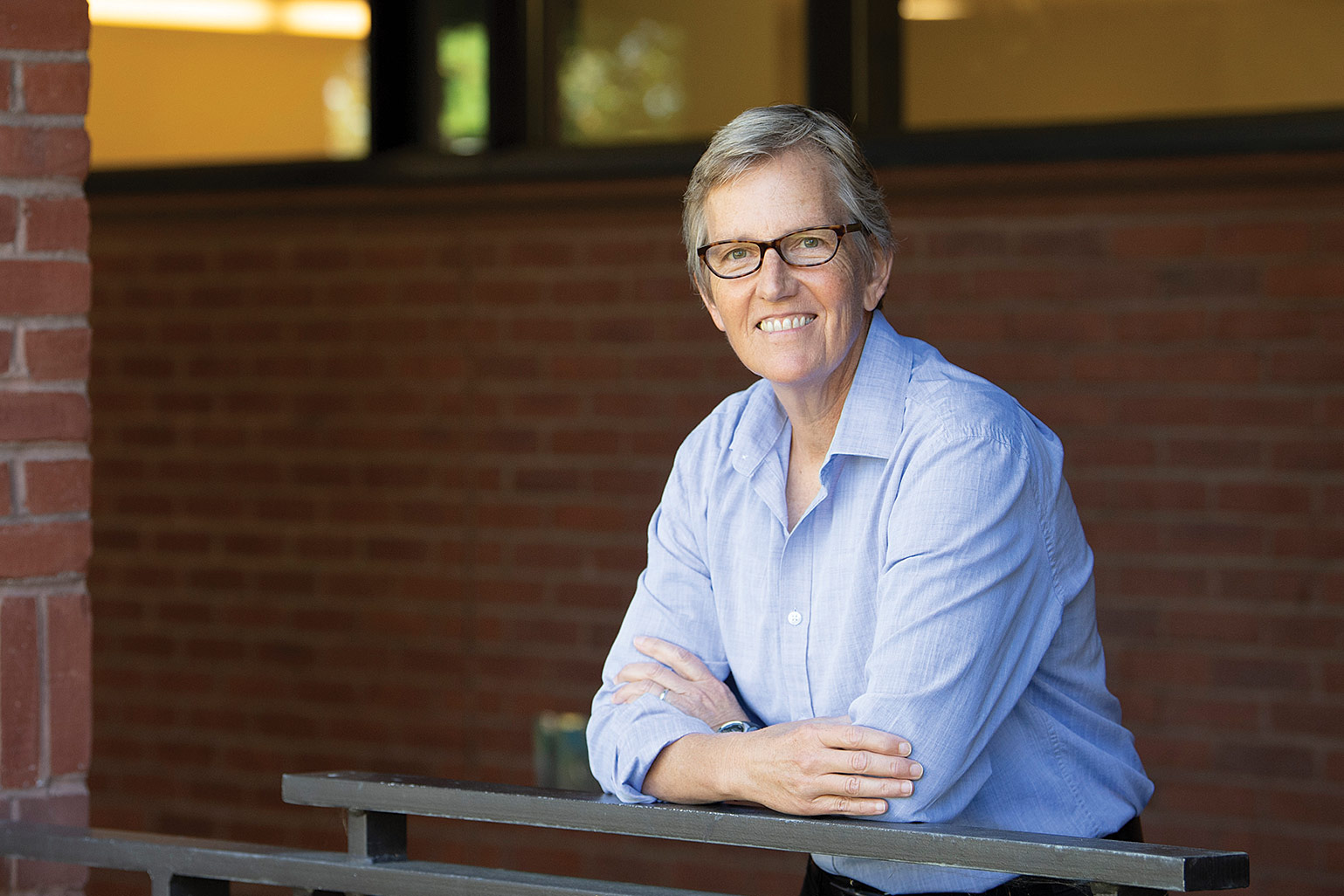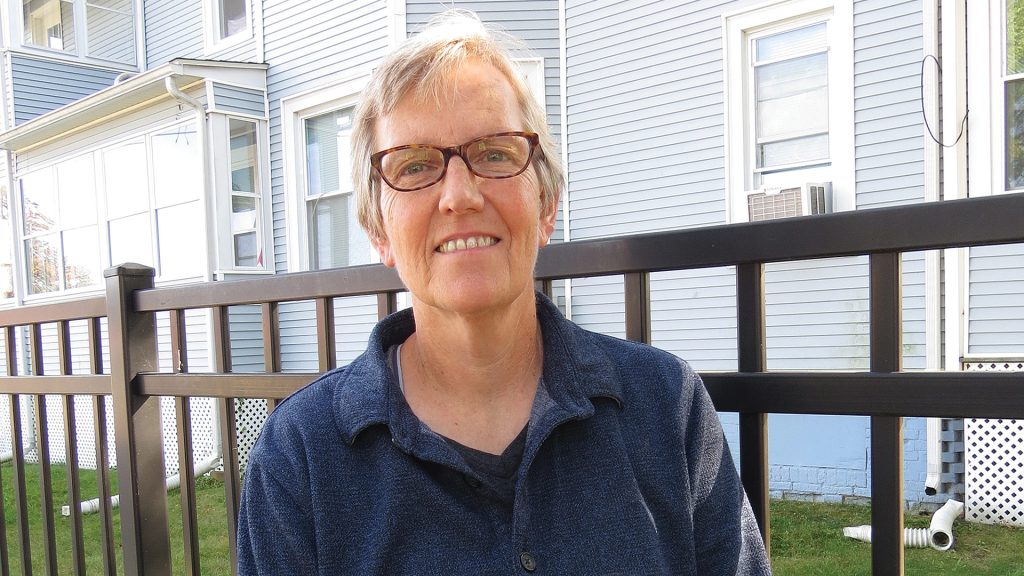Director, Center for Service and Leadership at Springfield College
She’s Built Stronger Bridges Between the College and the Neighborhoods Around It

Charlene Elvers says she and others at Springfield College affectionately refer to it as the “listening tour.”
It happened around seven years ago, she noted, and as that name suggests, there was a lot of listening going on — and there is still a good bit of it today. This tour, if you will, was prompted by her desire to build more and stronger bridges between the college and the two neighborhoods that surround it — Old Hill and Upper Hill — which, when you get right down to it, is her basic job description as director of the school’s Center for Service and Leadership.
The assignment, which had many components, included asking residents in those neighborhoods if they saw any tangible benefits to having the college in their backyard and, likewise, asking SC students if they saw any benefits, as in learning or growing opportunities, from being in that neighborhood. When both constituencies answered, for the most part, ‘no,’ Elvers knew she had to take some steps to change those responses.
“I wanted to someday talk with people who said, ‘one of the great benefits of living here is having Springfield College as a neighbor,’” she said, adding that, as a result of all that listening and the answers garnered, she spearheaded the creation of the Center for Leadership and Civic Engagement, an arm of the Center for Service and Leadership. It’s located in a three-story house a few blocks from campus and is, quite literally, a bridge between the community and the school.
It is mostly quiet now as a result of the pandemic, but before COVID-19 arrived, it housed a homework-help drop-in center and a middle-school mentoring program — initiatives that are both being carried out remotely.
“It is great when college students really see things from a different perspective, when they develop relationships with people who come from a different place than they came from.”
In the future, Elvers sees vast potential for the site also housing a bicycle-repair shop — her listening revealed that there isn’t one anywhere in the city, and there’s a real need for one — and that the large open space adjacent to the house can be used for fitness and recreation programs.
The Center for Leadership and Civic Engagement is perhaps the most visible manifestation of a 20-year stint at Springfield College that has been spent developing high-impact programs that seek to foster connections between the college and the community while working collaboratively with partners to identify and serve their needs.
Elvers told BusinessWest this is very rewarding work, and one of the biggest rewards is seeing how this involvement with those in the neighborhood prompts students to ask poignant questions about what they see and hear — and start to develop the resolve to help answer them.

“It’s great to have one foot solidly on this campus and another foot solidly in the community to bridge those two organizations,” she told BusinessWest. “It is great when college students really see things from a different perspective, when they develop relationships with people who come from a different place than they came from.
“I see them really begin to gain a broader a broader understanding of some of the social issues that are happening, and that’s when they begin to ask questions,” she went on. “They ask, ‘how did this happen? How did we end up here? Why are we in a neighborhood where there isn’t a grocery store?’”
Through her work to build these bridges between the college and the community, and through her efforts to inspire those kinds of questions from students, Elvers has clearly shown she is a true Woman of Impact.
School of Thought
Elvers, who has spent her entire career in higher education, came to Springfield College after a stint at Mount Holyoke College as director of Student Activities. In that capacity, her work drew her increasingly toward helping students connect with — and serve in — the communities they call home.
She summed up her career, and her time at Springfield College, this way. “While I have taught in a classroom from time to time, mainly my teaching is outside the classroom, and it comes through facilitating experiences for students to enhance their educational experience as well as to develop them into leaders.”
This passion, and it can only be called that, has been taken to new and higher levels at Springfield College, where, for more than a decade, Elvers oversaw the school’s annual Humanics in Action Day, which provided direct service throughout the community, and also transformed it — from a day of service to ongoing grants and support for individuals and groups wishing to partner and serve with community organizations.
“There has to be more that we can do to come together as a college and a local community and work together to make this neighborhood everything it can be and everything we want it to be.”
She also succeeded in building upon several existing programs, including a mentoring initiative, called the Partners Program, that has linked students at the college with young students at DeBerry and Brookings elementary schools for nearly three decades now.
“We have 80 pairs of mentors between the two schools,” she said, adding that the college has worked extensively with those elementary schools as well with organizations combating some of the long-standing issues in those neighborhoods, including food insecurity, homelessness, and others.
It was through these initiatives that Elvers came to understand that the college could, and should, take its involvement to a higher plane.
“Over the years, and from just getting to know a number of the families from the DeBerry school and the Brookings school, I began to realize that, in these two neighborhoods, there were a lot of families that had great ideas and things they wanted to see in their neighborhoods that weren’t there. And I began to wonder if there were ways to connect our students and facility and staff directly with the community. Working together, I thought we could start to facilitate some of the changes that we would all like to see.”
Thus commenced the listening tour, which was launched with a basic premise. “There has to be more that we can do to come together as a college and a local community and work together to make this neighborhood everything it can be and everything we want it to be.”
To that end, the school, with Elvers taking a leadership role, acquired the property that became the Center for Leadership and Civic Engagement.
Now in its fifth year, the center is a work in progress, Elvers said — progress that has in some ways been limited or slowed by COVID, but progress nonetheless.
From countless discussions with those in the neighborhood and from listening at dozens of school and church meetings, Elvers said two clear needs emerged: educational opportunities for young people outside of school, and health and wellness programs and activities for people of all ages.
The first initiatives launched were the middle-school mentoring program and the homework-help drop-in center, both of which have continued with virtual platforms, a shift that has actually enabled them to help more young people — and get more Springfield College students involved with the community.
And this brings Elvers back to the reason why it is so important to build these bridges between the college and the community. The biggest is to, in some ways, improve quality of life for those in Old Hill and Upper Hill. But there are others, especially the manner in which these programs help open students’ eyes to the challenges facing those living in these neighborhoods, prompt them to ask questions, and perhaps inspire them to help come up with answers.
Referencing the fact that there is no supermarket in that area of Springfield, Elvers said students will hear stories from the families and individuals they work with that really open their eyes.
“I have students who will say, ‘I’m working with these young people, and they have a hard time getting food, and when I ask them about it, they say they have to go somewhere else to go to a grocery store. And they’ll say they take the bus, but the driver only lets my mom take on two bags of food — and we need more food than that.’
“Our students often don’t realize the challenges that sometimes face these families,” Elvers went on. “And when they hear these stories, they start to realize, and that’s when they start to ask questions, like ‘why would there not be a grocery store in this neighborhood?’ and ‘who’s doing something about that?’ and ‘how do we get involved in that?’ and ‘what’s the process by which that can happen?’
“I have seen more college students ask the really important questions and start to engage after they’ve developed a relationship with a local family and learn of the challenges that are happening,” she continued. “These are challenges that some of them would never have faced.”
Grade Expectations
Opening students’ eyes to these challenges, these problems confronting those living just outside the campus, has become part of Elvers’ mission and work.
Her business card says she is the director of the Center for Service and Leadership. But she’s really a builder — a builder of relationships, of connections, of bridges between two entities that share a zip code but often little else.
And her success as a builder explains why she’s a Woman of Impact.
George O’Brien can be reached at [email protected]




